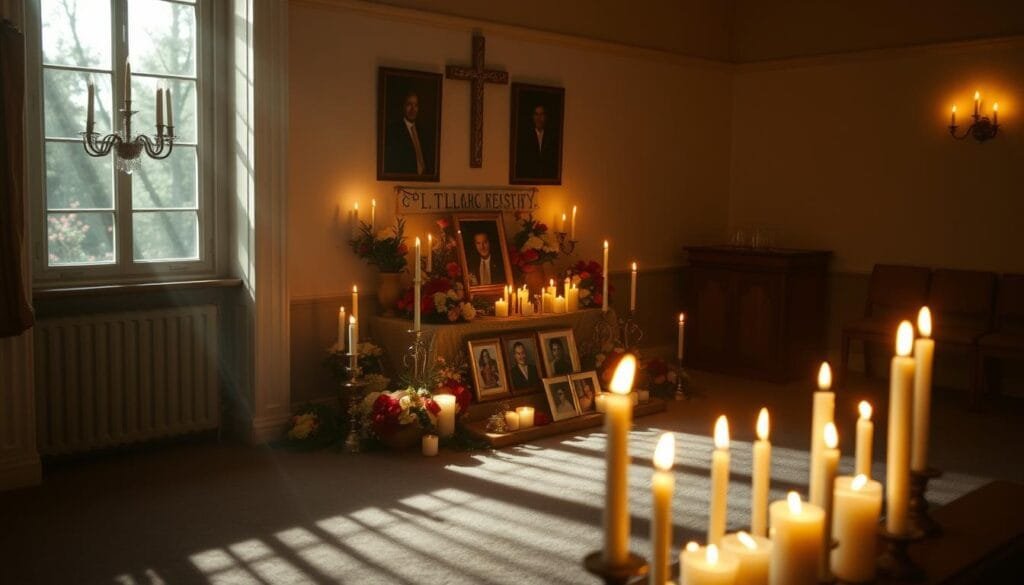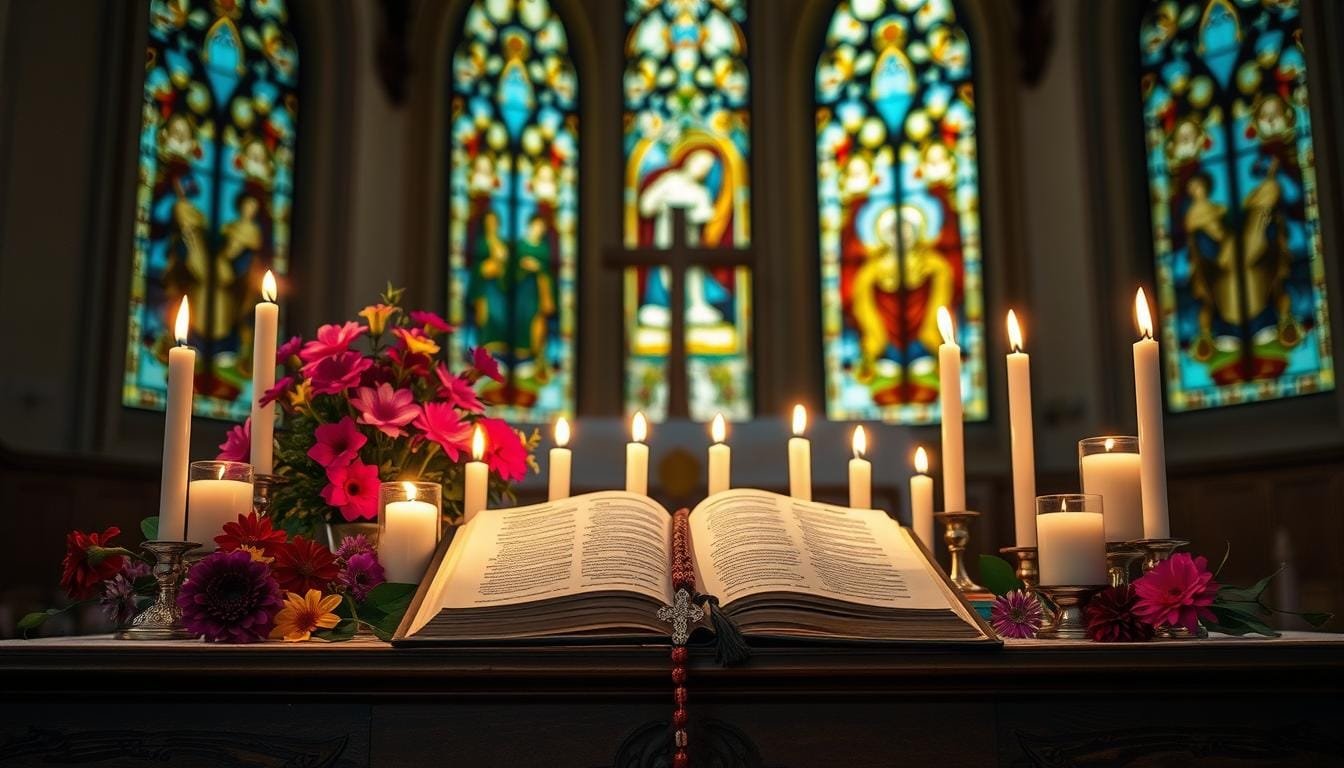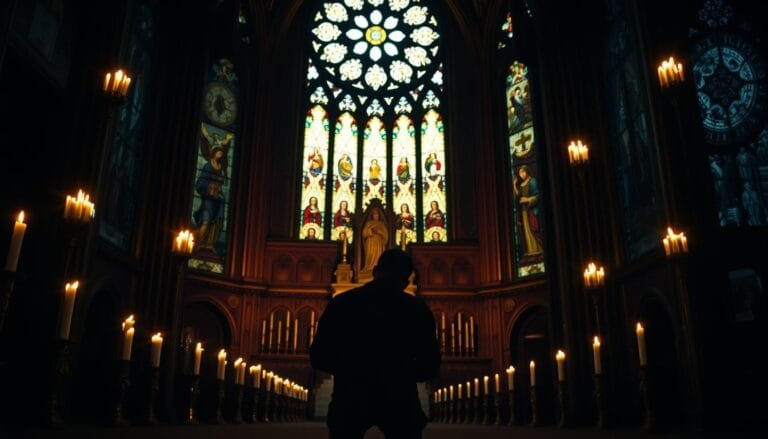Engage in the Solemn Tradition of the 9-Day Prayer For The Dead
This website contains affiliate links. As an Amazon Associate, I earn from qualifying purchases. The content on this website was created with the help of AI.
Curious about the impact of consistent prayer? The novena, a nine-day Catholic devotion, offers a deep spiritual experience.
This ancient practice has touched many lives, connecting heaven and earth.
Discover the rich history of novenas. This devotional practice, rooted in early Christianity, has become a powerful spiritual expression.
From Elizabeth Seton to modern believers, novenas have shaped many faith journeys.
Novenas aren’t just for Catholics. Lutherans, Anglicans, and Eastern Orthodox Christians also practice this meaningful tradition.
It unites believers across denominations in a shared spiritual pursuit.
Let’s explore the various forms of novenas. We’ll uncover their historical development and worldwide impact.
There’s something here for both experienced practitioners and newcomers alike.
Key Takeaways
- Novenas are nine-day prayer traditions with deep roots in Christian history
- This spiritual practice is observed across various Christian denominations
- Novenas can be dedicated to saints, angels, or aspects of the Holy Trinity
- The Catholic Church recognizes three main categories of novenas
- Novena practices vary globally, incorporating local traditions and customs
- Elizabeth Seton, the first American-born Catholic saint, has influenced novena traditions
Understanding the Sacred Origins of Novena Prayers
Novena prayers have deep roots in the Catholic tradition. These ancient practices hold biblical significance and have endured for centuries. Let’s explore the origins of this sacred custom.
The Biblical Foundation of Nine Days of Prayer
Novenas draw inspiration from the nine days between Jesus’ Ascension and Pentecost. The disciples gathered in prayer during this time, setting a precedent for nine-day devotions.
In Scripture, the number nine often symbolizes suffering and grief, adding depth to novenas.
Historical Development from Early Christianity
Novena history blends ancient customs with Christian practice. The Roman Parentalia, a nine-day commemoration for ancestors, influenced early Christians.
They adapted this tradition, infusing it with spiritual meaning.
By the 11th century, novenas became a way to petition saints for favors. This evolution showcases the growth of this Catholic tradition over time.
Vatican Recognition and Modern Practice
The Catholic Church formally embraced novenas through papal approvals, notably by Pope Pius IX. Today, novenas remain a vibrant part of Catholic life, serving various purposes:
| Novena Type | Purpose |
|---|---|
| Mourning | Comfort in grief |
| Preparation | Spiritual readiness |
| Prayer | Seeking divine intervention |
| Indulgences | Obtaining special graces |
Novenas like the Immaculate Heart of Mary and Our Lady of Guadalupe unite the faithful. These prayers embody the enduring power of this sacred tradition in modern times.
Engage In The Solemn Tradition Of The 9-Day Prayer For The Dead
The nine-night vigil is a touching Catholic mourning practice. It comforts grieving families and unites communities. This tradition brings people together for remembrance and support.
Essential Elements of the Nine-Night Vigil
Spiritual components form the core of the nine-night vigil. Families gather to pray, read Bible passages, and sometimes include music.
This prayer for the dead creates a space for healing and reflection.
Communal Aspects and Family Participation
Community involvement is crucial in the nine-night vigil. Loved ones share food and memories. This collective support strengthens bonds and eases the pain of loss.
The practice often extends beyond the immediate family. It can touch entire neighborhoods, fostering a sense of unity.

Cultural Variations and Modern Adaptations
The nine-night vigil varies across cultures. Urban settings may shorten the tradition due to busy lifestyles. Younger generations often include music, creating a celebration of life.
These adaptations keep the custom alive. They honor changing times while preserving the tradition’s essence.
Traditional Practices and Rituals
Unique rituals enhance the nine-night vigil. Some families rearrange furniture to guide the spirit’s journey. Others focus on religious readings.
These cultural traditions provide structure and meaning. They offer comfort during difficult times.
| Traditional Elements | Modern Adaptations |
|---|---|
| Bible readings | Music celebrations |
| Communal prayer | Shorter gatherings |
| Food sharing | Virtual participation |
The nine-night vigil remains a powerful expression of faith. It offers solace through shared prayer and remembrance. This practice embodies the essence of Catholic mourning traditions.
Conclusion
Novenas hold lasting importance in our spiritual lives. These nine-day prayers offer profound novena benefits, fostering growth and comfort.
They’ve adapted to modern needs while keeping their essence.
In our busy world, novenas offer solace and reflection. They provide a structured approach to prayer, deepening faith, and community connections.
This is crucial as funeral practices change and families balance grief with daily life.
Novenas bridge cultural gaps, uniting diverse communities in prayer. From Mexican American traditions to urban adaptations, these practices continue to evolve.
They prove their resilience and relevance in today’s world.
By engaging in novenas, we honor our departed loved ones. We also strengthen our spiritual foundations and community support networks.
These practices offer a path to enrichment and coping with loss.
Let’s embrace the power of novenas in our lives. They bring comfort, hope, and unity to believers across generations. Through novenas, we keep a sacred tradition alive and thriving.






